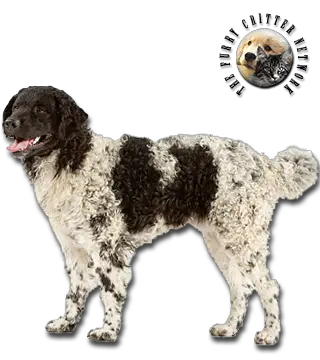Breed Standard
Head: Strong, powerful, cleanly cut. Broad, slightly domed skull. Stop not very pronounced. Straight nosebridge. Strong muzzle. Nose well-developed, black or brown, depending on coat color. Lips not pendulous.
Ears: Set on fairly low. Medium in length, carried against the head, not twisted. Covered with curly hair that is fairly long at the base.
Eyes: Medium-sized, oval, slightly slanted. Dark brown or brown, depending on coat color.
Body: Very sturdy. Square build. Neck short, strong, without dewlap. Broad chest. Well-sprung ribs. Strong loin. Moderate tuck-up.Short, straight back. Fairly level croup.
Tail: Long and curled, carried above the croup or on the side.
Hair: Except for the head and legs, the entire body is covered with thick curls of stiff, thick hair that is fairly harsh and oily to the touch.
Coat: Solid black or brown, black with white spots, or brown with white spots. A combination coat and patches are allowed.
Size: Ideal: Dog: 59 cm (23 in); bitch: 55 cm (22 in).
Weight: Approx. 25 kg (55 lb).
History
Wetterhoun is Dutch for "water dog." Developed by the efficient breeders of the Dutch province of Friesland at least 400 years ago, this rare breed is seldom seen outside its native land. It was most likely descended from the Old Water Dog, a breed that contributed to a number of modern-day spaniel types but is now extinct. The Wetterhoun was developed at the same time as the Stabyhoun. The Wetterhoun specializes in locating and killing otters. After otters became more manageable in the northern parts of the Netherlands, the breed was used to hunt small land mammals such as polecats, and to guard farms. The Wetterhoun is a rugged, well-built and effective gundog capable of flushing and retrieving on both land and water.
Behavior
This breed is an excellent gun dog, effective as both a land and water retriever, however its strong will and natural guarding abilities make early training a requirement. The breed standard describes the breed's temperament as reserved and "an ideal guard-dog", though never aggressive, which makes it an excellent family-dog. Although described as "strong willed" the Wetterhoun is never stubborn or wilfully disobedient. Perseverance is a much better term, because they finish what they started, whatever it takes. Imperturbable they finish what they think to be their task. Thereby the breed is sensitive and should never be treated or trained harshly. Brought-up and used to children they are tolerant to children to the point where the dog should be protected against the children instead the other way around.
He is not a city dog. He needs space and lots exercise, as well as regular brushing and combing.
Function
Hunting Dog, Companion Dog.
Health
This is a very hearty breed. No known health problems.






